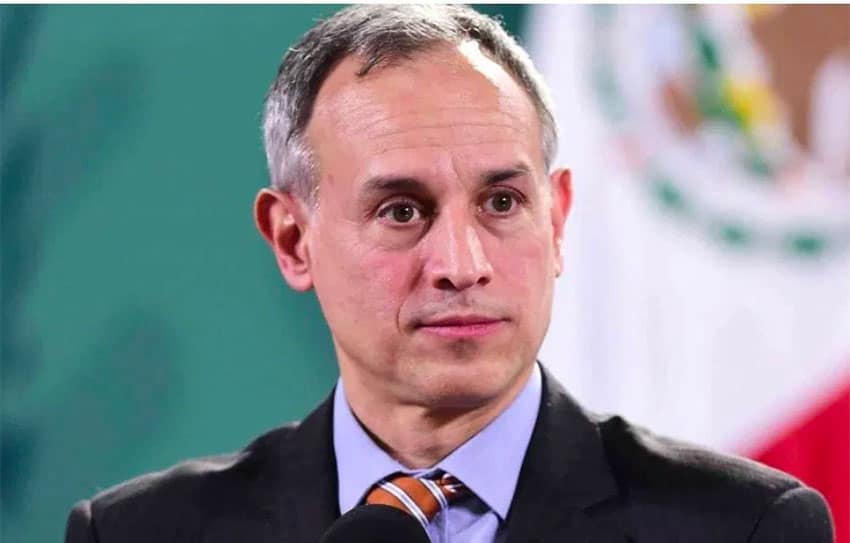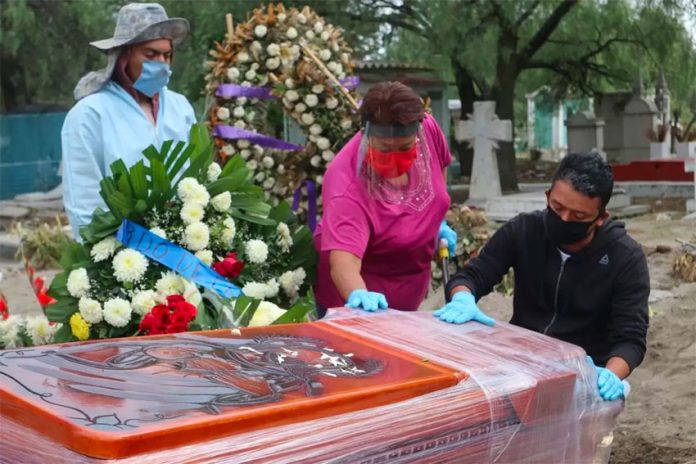Deaths in Mexico last year were 52% higher than in previous years, putting the rate of excess deaths during the coronavirus pandemic well above that in some countries seen as suffering the worst outbreaks in the world, including the U.S., U.K. and Brazil.
New official data showed Mexico has registered 977,081 deaths since March 2020, compared with an expected 641,556 for the same period based on the 2015-2019 death tolls. Since the start of the epidemic, Mexico has officially confirmed more than 2 million cases and 181,000 deaths from Covid-19.
Total so-called excess deaths per million in Mexico last year were 2,602 — 52% higher than 1,713 in the U.S. and nearly twice as high as Brazil’s 1,047, according to Eugenio Sánchez, a Mexican statistician who has examined world mortality data compiled by Israeli economist Ariel Karlinsky and Russian researcher Dmitry Kobak. Compared with the U.K., Mexico’s toll is 75% higher.
Peru was the world’s worst-hit nation, according to that data, and Ecuador and Bolivia have also been hard hit in terms of excess deaths during the pandemic, underscoring the virus’s heavy human toll on Latin America.
The tally of excess deaths in Mexico has called into question whether its largely hands-off approach was the right one. But Hugo López-Gatell, Mexico’s coronavirus czar, told the Financial Times in an interview that his “conscience is very clear.”
“We all agree that excess mortality in 2020 compared with previous years is explained by Covid, directly or indirectly,” López-Gatell said.
He blamed political opponents for trying to twist facts. “It’s a pandemic. It would be senseless to think life would be normal. It’s a human drama. What is happening is very sad,” he said.
“But the public narrative tends to be that there’s something strange and hidden going on that’s different to what the government says. We have nothing to hide . . . It sometimes appears that we’ve been found out and we are irremediably trying to cover things up. That is not the case. Our conscience is very clear.”
Mexico imposed a nationwide lockdown from March to June 2020 but has not enforced confinement measures, enacted travel bans or made mask-wearing mandatory, arguing that draconian measures could not work in a country with millions in informal jobs needing to work in order to eat.
But officials have sometimes ignored their own data — for instance, imposing tougher restrictions in Mexico City last December two weeks after its own indicators on hospitalizations, cases and deaths indicated it should. It recently bowed to pressure from businesses to allow shops and restaurants to reopen even as hospital occupancy was trending upwards.
Analysts said that was a tacit acknowledgment that the cost in lives lost was regrettable but inevitable, given the low level of government support despite the deepest economic recession since 1932.

“These are the consequences of a strategy based on trying to do nothing to reduce the damage instead of trying to prevent the consequences,” said Máximo Jaramillo-Molina, a fellow at the London School of Economics who researches inequality. He found that the death toll in Mexico City had disproportionately hit poorest neighbourhoods.
Independent researchers Laurianne Despeghel and Mario Romero reckon that Mexico City has the highest level of excess deaths of any city in the world, at 8,411 deaths per million inhabitants.
Their research found Mexico City’s excess deaths tally per million was 46% higher than the next worst city, Lima; 157% above New York; 190% above Madrid; and some 349% higher than London, according to Mexican data and the Financial Times’ coronavirus tracker.
Despeghel said the nationwide excess mortality data could yet be revised higher since reporting from some states experiences delays.
“The reason there are lots of deaths is that there have been lots of infections,” she said. “Mexico didn’t close its borders or do mass testing and isolation.”
But López-Gatell said the decision not to conduct mass testing was “absolutely” validated. At the start of the epidemic “an idea, that has no scientific basis, was positioned in the public narrative that the more you test, the better you control the epidemic,” he told the Times.
He said opposition politicians and columnists “sowed these ideas systematically” and were seeking to “discredit the government … in political terms that have nothing to do with science.”
On Saturday, López-Gatell disclosed on Twitter that he had caught Covid-19, writing that his symptoms were “mild” and he would continue to work from home.
Mexico says hospital occupancy has now been trending down for three weeks. President López Obrador, who said last April that Mexico had tamed the virus, has said the country will bounce back quickly.
“If you’re serious and rigorous, there are always lessons to be learned in managing the epidemic,” López-Gatell said. “The danger is to enumerate those lessons … because they get simplified and taken as if they were mistakes.”
© 2021 The Financial Times Ltd. All rights reserved. Please do not copy and paste FT articles and redistribute by email or post to the web.
